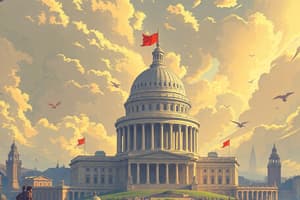Podcast
Questions and Answers
What is the primary focus of Rajniti Vigyan (Political Science)?
What is the primary focus of Rajniti Vigyan (Political Science)?
- The contestation of power within a political system
- The interaction between individuals, groups, or parties
- The study of power, governance, and public policy (correct)
- The practice of making and implementing decisions
What does Raajneeti (Politics) primarily involve?
What does Raajneeti (Politics) primarily involve?
- The contestation of power within a political system
- The practice of making and implementing decisions (correct)
- The study of power, governance, and public policy
- The interaction between individuals, groups, or parties
Which aspect varies across nations, cultures, and historical periods?
Which aspect varies across nations, cultures, and historical periods?
- Political systems (correct)
- The practice of making and implementing decisions
- The contestation of power within a political system
- The study of power, governance, and public policy
What is the main focus of Political Systems?
What is the main focus of Political Systems?
What do political parties do in a democratic system?
What do political parties do in a democratic system?
What is the essential function of elections in democratic systems?
What is the essential function of elections in democratic systems?
What is political socialization?
What is political socialization?
What does the study of public policy help us understand?
What does the study of public policy help us understand?
What is the focus of the study of political conflict and peace?
What is the focus of the study of political conflict and peace?
What is the aim of comparative politics?
What is the aim of comparative politics?
Flashcards are hidden until you start studying
Study Notes
Social Science Rajnetik Dali Ke Liye Chunatiya: Exploring Rajniti Vigyan and Raajneeti
In the context of the provided phrase, "Social Science Rajnetik Dali Ke Liye Chunatiya" doesn't directly translate to a well-defined English topic. However, I will attempt to provide a comprehensive and fact-rich discussion about the related concepts of 'Rajniti Vigyan' (Political Science) and 'Raajneeti' (Politics).
Rajniti Vigyan (Political Science)
Political science is the study of power, governance, and public policy. It examines how political systems function, how governments make decisions, and how citizens interact with their governments. Rajniti Vigyan – or Political Science in Hindi – seeks to understand the foundations of political systems, the role of political actors, and the impact of political decisions on society.
Raajneeti (Politics)
Politics, meanwhile, is the practice of making and implementing decisions that affect a group or community. It involves the interaction between individuals, groups, or parties to achieve certain goals, such as advancing policy objectives, electing representatives, or increasing influence. Raajneeti – or Politics in Hindi – refers to the practical application and contestation of power within a political system.
Subtopics
-
Political Systems: Political systems vary across nations, cultures, and historical periods, ranging from authoritarian regimes to democratic governments. The study of political systems helps us understand how different governance models function and how they affect citizens' lives.
-
Political Parties: Political parties are groups of individuals who share common goals and ideologies. They compete for power by nominating candidates for elections and advocating for policies that align with their agendas.
-
Elections and Voting: Elections, in which citizens cast their votes to choose their political representatives, are essential elements of democratic systems. The study of elections helps us understand the factors that influence voting behavior and how electoral systems can be improved.
-
Political Leadership: Political leaders play a pivotal role in shaping the decisions and actions of their governments. The study of political leadership helps us understand the qualities of effective leaders and the impact of leadership styles on the decision-making process.
-
Political Socialization: Political socialization is the process by which individuals acquire their political values, beliefs, and attitudes. The study of political socialization helps us understand how different factors, such as family, education, and mass media, influence political beliefs and behaviors.
-
Public Policy: Public policy refers to the decisions and actions of governments to address social, economic, and environmental challenges. The study of public policy helps us understand how policy decisions are made, how they impact society, and how they can be improved.
-
Political Conflict and Peace: Political conflicts arise when groups or factions with competing interests seek to advance their agendas. The study of political conflict and peace helps us understand the factors that contribute to conflict, the strategies that can be used to resolve it, and the role of political institutions in promoting peace.
-
Comparative Politics: Comparative politics is the study of political systems, political actors, and political processes across different countries and cultures. The study of comparative politics helps us understand how political systems evolve over time, how they are influenced by external factors, and how they can be improved.
In conclusion, while the provided phrase does not directly translate to a well-defined English topic, the concepts of Rajniti Vigyan and Raajneeti are integral to understanding political systems, political processes, and political outcomes. By exploring these concepts and their subtopics, we can deepen our understanding of the world around us and contribute to the development of more responsive, inclusive, and effective political systems.
Studying That Suits You
Use AI to generate personalized quizzes and flashcards to suit your learning preferences.




